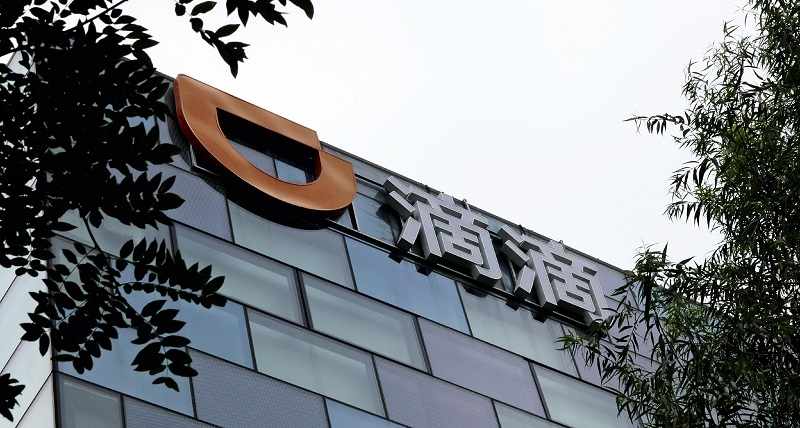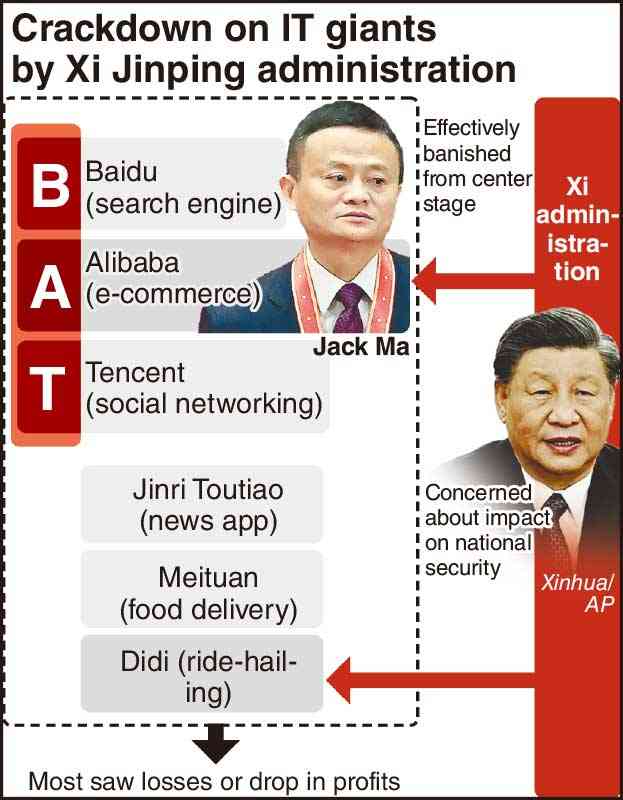CCP on shaky ground ahead of party congress / Xi’s crackdown on IT firms hampers their growth

Didi Chuxing Technology Co.’s headquarters is seen in Beijing in July 2021.
10:55 JST, September 9, 2022
The Chinese government is facing a number of challenges as it prepares for the Communist Party Congress next month. This is second in a three-part series analyzing the issues.
***
At the end of May, Chinese IT giant Didi Chuxing Technology Co. quietly pulled out of the food delivery market in Japan.
Back home in China, Didi boasts 170 billion yuan (¥3.5 trillion) in sales and a 90% share among ride-hailing apps in a country of 1.4 billion. Having taken control of the Chinese affiliate of Uber Technologies Inc. of the United States six years ago, Didi entered Japan’s taxi-dispatching and delivery market in 2018.
However, Didi was unable to break down industry leader Uber’s hold on the Japan market.
Furthermore on July 21, China’s cybersecurity regulator determined that Didi had “seriously affected national security” by collecting 64.7 billion pieces of personal information, including facial recognition data and addresses, from the smartphones of its app’s users.
Didi was hit with a 8 billion yuan fine and, while the case was being investigated, has been forced to stop newly distributing the ride-hailing app for the past year. The company fell 50 billion yuan into the red in fiscal 2021, one reason for its withdrawal from some of its business operations in Japan.
The Chinese government’s clampdown on the three IT giants Baidu, Inc., Alibaba Group Holding Ltd. and Tencent Holdings Ltd. — collectively known as “BAT” — has also intensified over the past two years.
Operating a wide range of businesses that go beyond internet-related fields, from finance to electric vehicles, the BAT companies have become a strong counterpart for GAFA — Google LLC, Amazon.com, Inc., Facebook, Inc. (now Meta Platforms, Inc.) and Apple Inc. Didi, founded in 2012, is considered to be just behind the BAT companies.
But all is not rosy. Baidu and Tencent have been accused of antitrust violations, and Alibaba Group founder Jack Ma was effectively banished from the business stage.
In 2021, the IT and digital sectors accounted for 39.8% of China’s gross domestic product, nearly four times the 2002 level. A source at a Chinese newspaper said Chinese President Xi Jinping’s administration has deep concerns that China’s one-party rule could be shaken if it does not rein in companies that have grown too big.

■ Investment funds back off
The Xi administration’s crackdown on the IT industry is coming in the name of “national security,” which holds its highest priority.
With a myriad of laws at its disposal, including those aimed at antitrust violations, personal data protection and cyber security, the administration is tightening internet restrictions, most likely to prevent the big data owned by the IT giants from flowing to the United States.
An overseas-based 29-year-old Chinese tech entrepreneur who visited Beijing in May for capital investment negotiations could not hide his bewilderment. He said that he called on about 50 investment funds, and each one gave the same response: “We have no money to invest in your company.”
Although the IT industry is expected to enjoy high growth, interest from fund managers has mostly turned to semiconductors. Financial capital managed by the funds are primarily sourced from military-related companies and state-owned enterprises.
“There is no doubt that decisions are made in line with the wishes of the Communist Party,” the entrepreneur said.
Seven years ago, the Xi administration, fixated on challenging U.S. supremacy, compiled an economic development plan to foster high-tech industries called “Made in China 2025.” Particular emphasis was placed on promoting domestic production of semiconductors, which are so vital to economic security. But the target ratio for domestic semiconductor production, set at 70% by 2025, is said to be still around 30% three years before the deadline.
In July, authorities launched investigations of top executives of the state-backed semiconductor fund, the China Integrated Circuit Industry Investment Fund Co., and Chinese semiconductor giant Tsinghua Unigroup Co., over allegations of corruption.
“The crackdown must have reflected the administration’s intent to provide a jolt to speed up domestic production,” a Japanese government source said.
■ Measured amounts
During the SARS (severe acute respiratory syndrome) outbreak in China in 2003, an incident occurred involving Alibaba’s Ma that showed how China has benefited from measured amounts of government control and entrepreneurship.
When one of Ma’s employees became infected with SARS, health officials ordered that all of his workers, totaling about 400, quarantine at home for 12 days. Within two hours, Ma set up internet connections in almost all of their homes, allowing them to continue working and helping the company overcome a crisis.
Ma is believed to have sensed a tailwind for online commerce at that time, which made him more committed to IT.
SARS prompted the government of then Chinese leader Hu Jintao to formulate the first national strategy on digitization. The three BAT companies, which had been founded just a few years before between 1998 and 2000, used the deadly disease as a springboard to rapid growth.
The masterstroke of tolerating start-ups while controlling them became the source of China’s economic growth. But further crackdowns by the Xi administration under the coronavirus pandemic could undermine that growth model.





